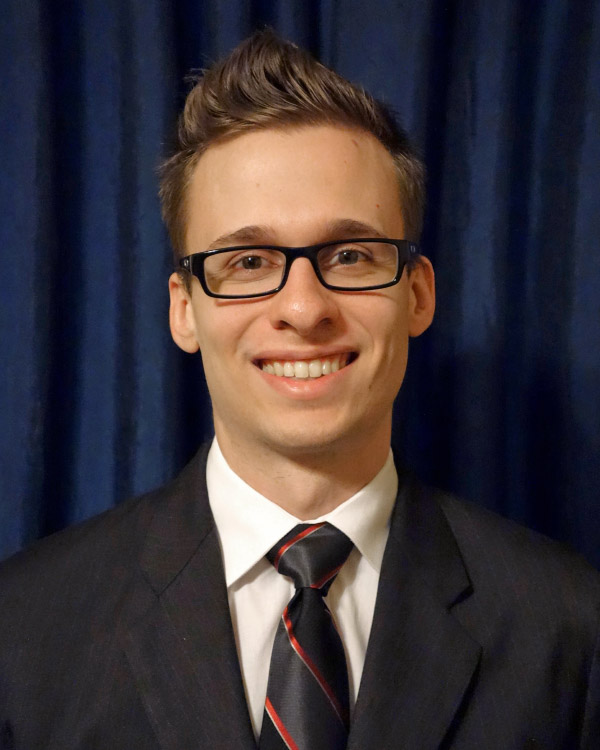
James Griffin BS’18
James Griffin BS’18 describes himself as shy, but ask him, “What’s new?” and his smile lights up the room.
“I just won an OZY award,” said Griffin, a 21-year-old entrepreneur who graduated magna cum laude in May with a computer science degree from the Erik Jonsson School of Engineering and Computer Science.
Pronounced “Ozzy,” the award has nothing to do with heavy metal icon Ozzy Osbourne. But Griffin does hope his startup will rock the world of academic advising.
Griffin is one of only 10 students nationwide to win OZY Genius Awards this year. Created by the news site ozy.com, the annual awards recognize students who “have the brains, ideas and inspiration to change the world.” Winners receive grants of up to $10,000 to pursue their passion projects.
“When I found out, I was on deadline. So I went outside, screamed a little, and then I had to get back to coding,” Griffin said.
His winning entry, called RamifAI (pronounced ‘ramify’), is an artificial intelligence-based college advising app that helps students navigate the requirements of their desired degree programs. The project was among the first cohort for the UTDesign StartUp Challenge.
Griffin said the award should help his startup “scale faster and implement all the features” he has planned, starting with hiring a full-time lead programmer.
Changing Majors Inspires Idea
Griffin had strong academic chops at a young age, graduating from high school and beginning college at age 16.
“High school bored me. I had problems with rules,” Griffin said. “I remember I ticked off my Algebra II teacher so much, she said, ‘Just teach yourself pre-calculus.’ So I taught myself pre-calculus and tested out of it so I could take calculus as a sophomore.”
Griffin said RamifAI’s purpose was inspired by his experience with how changing majors can derail a college student’s plans.
“If you take one wrong class, you can be delayed a semester, sometimes longer,” he said. “When I changed majors, I found out too late that I took the wrong prerequisite, so it took me longer to graduate. Sometimes you make a little mistake in your career and it has massive repercussions. Suddenly, you have a lot of debt, and you’re taking the wrong classes for your major.”
Griffin said RamifAI addresses that, guiding both advisors and students to the ideal path to graduation and predicting potential roadblocks.
“It allows students to plan out their change of major so they can see how it affects them. That will save both time and money,” he said.
Griffin said it also helps college advisors manage their caseloads more effectively.
“Many advisors juggle more than a half-dozen software programs: one to record things, one to audit, one to manage documents and so on,” he said.
Bringing AI to Advising
RamifAI works by interacting with a company that crunches numbers, lines up courses and matches the information with other non-student data. Griffin used student enrollment and targeted elective data to teach RamifAI about common coursework and career paths.
“For instance, many students begin their college careers in computer science, but then switch to business,” Griffin said. “The software has learned that and can suggest courses that keep that path open for the longest amount of time.”
“I’ve got the computer science department, business advisors and administrators all supporting me. I have the entrepreneurship community behind me. RamifAI would not exist if I were not at UTD.”
James Griffin BS’18
In addition, RamifAI has a baseline model of what a student should be doing, and the context to ensure chances aren’t missed.
“If a class is only offered in the fall, our system alerts the advisor to that, and the student can take it into consideration,” Griffin said.
To help develop his app, Griffin sought advice from his UT Dallas advisors.
“I’ve had fantastic advisors,” he said. “I’ve involved them in this process, asking them, ‘What would you want to improve?’ They all had great suggestions. It’s one thing to do your job. It’s another thing to want to do your job better, and wanting to be involved in the process.”
He also praised the support he received from the Institute for Innovation and Entrepreneurship in the Naveen Jindal School of Management, which provides startup resources for students, alumni, faculty and staff.
“If I went to another school for this technology, it would not have worked out,” he said. “I’ve got the computer science department, business advisors and administrators all supporting me. I have the entrepreneurship community behind me. RamifAI would not exist if I were not at UTD.”
Griffin says the next step is to market his app to universities and their students. He eventually wants to bring it to high schools for use in school selection and scholarship applications.
“I hope to help students choose the correct college out of high school,” he said. “Many students are discouraged from applying to certain colleges because they don’t think they can afford it. There’s a large information gap.”
For now, Griffin says he’ll keep on coding.
“We’re still adding features,” he said. “And we’re presenting it to a couple of decision-makers. I’m trying to build out our pipeline.”
He has big plans for his company.
“By December 2019, I want to make a million dollars in revenue. It’ll be fun to see how close I can get,” he said. “My ultimate goal is to get the Institute for Innovation and Entrepreneurship named after me, if for no other reason, because it doesn’t have a name on it at the moment.”